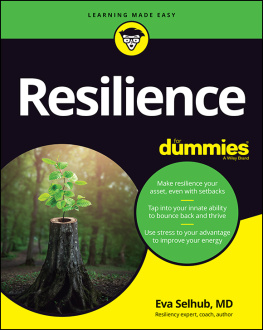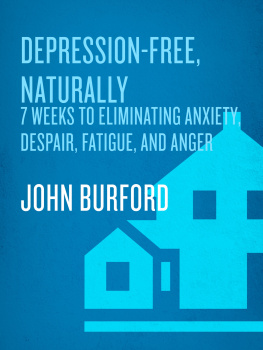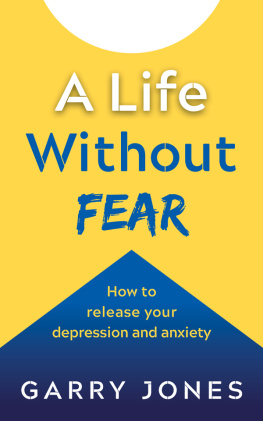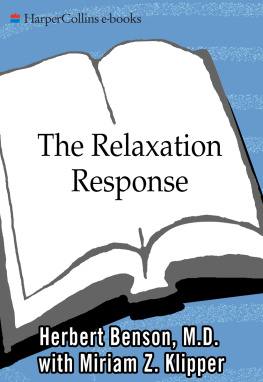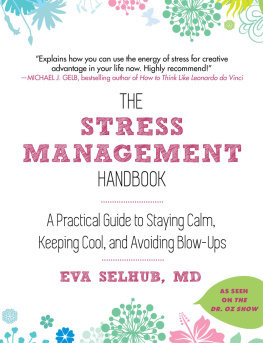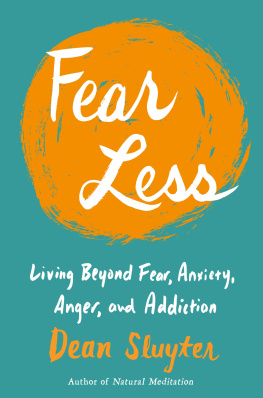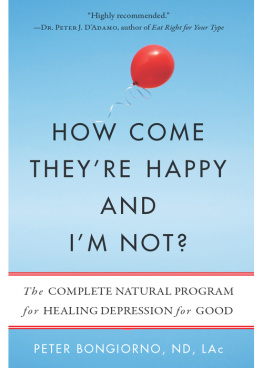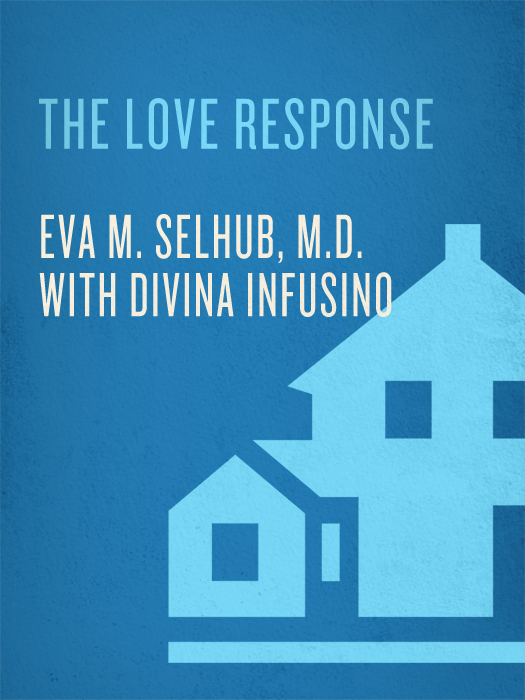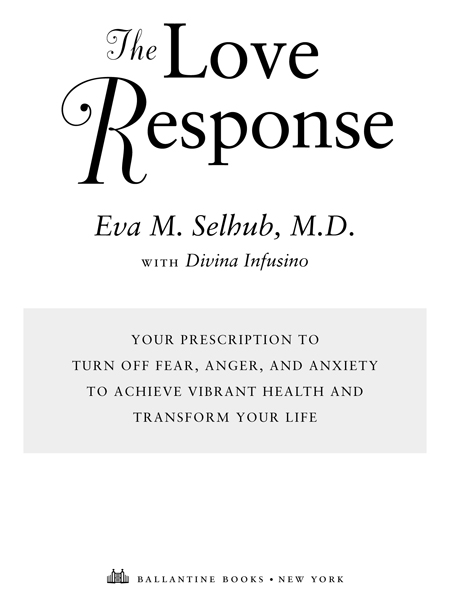13. SPIRITUAL LOVE IN ACTION:
D.I.G. (DIGNITY, INTEGRITY, AND GRACE)
INTRODUCTION
T hrough years of work with thousands of patients, Ive learned one unequivocal truth about human health: just because a disease enters the body does not mean its symptoms will manifest.
For most of my medical career, I have sought out the differences between a body that can fight disease and one that cannot, between one person prone to health and another to illness. What I found out is startling:
THE BIGGEST OBSTACLES TO GOOD HEALTH ARE
STRESS AND FEAR.
and
THE ANTIDOTE TO STRESS AND FEAR IS LOVE.
The Love Response is built on these premises.
My big moment of insight into stress and love did not occur in a clinical setting or through scientific means. It happened in a hospital delivery room the day my niece, Maia, was born.
On April 16, 2002, when I snipped her umbilical cord and held her for the first time, all my worries, fears, problems, and stress seemed to dissolve, and for a moment the world stood still. As Maia grew, I experienced this feeling again and again whenever I was with her. Then one day, while the three-year-old Maia rested on my chest, she lifted her head to look up at me, gently swept some hair off my face, and said, Auntie, I love you. There it was again: all my worries and fears evaporated in that moment.
I thought, How can this be? Time can never stand still, so why does it feel this way? Ive had this experience other times toowhen Id gazed at a beautiful sunset, listened to music, or bonded deeply to someone or something. It happens when I am in a state of awe or appreciation. What I realized was that in moments like this, we connect to the rhythm and flow of life and the gates of infinite possibilities open up before our eyes and in our hearts. Time doesnt stand still; rather, we are still.
As the medical director of the Mind/Body Medical Institute at the Beth Israel Deaconess Medical Center, I have witnessed the restorative power of the Relaxation Response, the series of biochemical events that occur in the body when you are in a state of deep relaxation most commonly brought on by the practice of meditation, tai chi, qi gong, or any other repetitive focus. I know how initiating the Relaxation Response enables patients to better handle stress, find wellness, and develop a belief that they can stay well in the future. Years of scientific research bears this out. Practiced regularly, the Relaxation Response reduces blood pressure, migraines, heart rate, muscle tension, and other symptoms of stress. In short, the Relaxation Response improves health.
In that one moment with Maia, I realized that a short burst of love had the same positive effects on my body as a long session of meditation. It seemed that love triggered a similar positive biochemistry as the Relaxation Response. But instead of requiring that I sit alone in a contemplative state for twenty minutes or more, love could achieve the same, even more predictable result in mere seconds.
I spent the next three years combing through research studies supporting this idea. As I pieced together the data, it revealed a scientific truth: when you experience love in any formlove for another, for yourself, for spirit or something greater than yourselfyou are healing your body. Why? Because love takes you out of the state of resis tance that causes stressthe stress that lays the groundwork for disease. With love, you experience less stress and fear every day. Of course you should see your doctor when you are concerned about your health, but with less stress and fear, you can be happier and healthier for the rest of your life.
So how can you bring the healing powers of love into your life? The Love Response will show you step-by-step, easy-to-use techniques that will keep you on a path to long-term wellness and well-being each and every day.
THE LOVE RESPONSE
The Love Response gives you the tools to heal your body from the ravages of stress and fear that most everyone constantly endures. It shows you how to build a life based on love in all its forms and how to change your thoughts and feelings of dread and pain to relief and joy in moments.
Each person has physical, emotional, psychological, and spiritual strengths as well as weaknesses. Health is not an end result but a lifelong process of discovering how to support your strengths and leverage your weaknesses as opportunities for growth. The Love Response gives you the tools for this process, so you can tune into your instincts in your own way, on your own timeline, and in harmony with your individual needs, goals, and motivations.
The Love Response enables you to build a life that reflects who you really area being meant to live in the dynamics of love, with bodies that can heal disease and sustain a lifetime of health.
MY STORY
Long before Maia was born, however, the pieces of the Love Response puzzle began to reveal themselves to me. Indeed, I learned the power of the Love Response through personal experience: I was my own first patient.
At age twenty-eight, I was a doctor on my way to specializing in pulmonary medicine. Then, in literally one moment, everything in my life changed forever.
On a beautiful June day, just weeks away from completing my second year of residency, I had been working for twenty hours straight in a Boston hospitals intensive care unit (ICU). All ten ICU beds were occupied by gravely ill patients.
At 2 a.m., exhausted, two interns and I shuffled to the call room. I had just dozed off when the emergency buzzer awakened me. A patients central IV line had fallen out and needed replacing. Being superwoman, I let the interns sleep and went to handle the problem myself.
I made my way to the comatose patients bedside and located the errant IV line. I had just managed to insert the IV needle into the patients vein when suddenly, without any warning, he began coughing and bucking. The needle slipped out and punctured my finger, right through my glove, exposing me to the blood of a patient who had fullblown AIDS and hepatitis C.
My mind raced in panic:
Oh, God! Ive been stuck! Look at all this blood I have to wash it off. If only I could cut my finger off now.
Should I tell someone? I dont want to tell anyone. I feel like a fool, like a failure. How stupid! What will people say what will they think? Theyll think that Im not good enough to be doing these procedures.
Maybe if I squeeze hard enough, all the blood will come out If only I could chop this finger off! Keep rinsing get some ammonia, alcohol something.
Should I tell someone? I need to tell someone. Who? I dont think Ill be able to get through this alone.
Before this moment, I had never experienced the threat of a real illness, either physical or psychological, that I could not handle on my own. I prided myself on being robust, self-sufficient, motivated, and capable. Like many women, I strove for perfection. To be anything less was not good enough and would mean that I wasnt good enough. Asking for help was not part of the agreement I made with myself. Asking for help would imply weakness, vulnerability, shame.
Now, in seconds, all those presumptions crumbled. I met my mortality face-to-face and everything that I had been striving toward became irrelevant and obsolete. For the first time in my life, I felt completely out of control of my body and health. I needed to ask for help. In one stroke, I felt like a victim.



